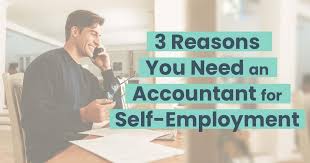Accountants for Self-Employed Professionals : For self-employed individuals, managing finances can be both time-consuming and complex. Without the structure of a corporate environment, freelancers, consultants, and small business owners often face unique financial challenges. Hiring an accountant for self-employed professionals can provide significant benefits, from streamlining tax preparation to optimizing financial strategies.
Why Accountants for Self-Employed, Need an Accountant
- Tax Compliance
Self-employed individuals must handle their taxes, including income tax, self-employment tax, and sometimes sales tax. Accountants ensure you comply with local, state, and federal tax regulations, minimizing the risk of penalties. - Deductions and Credits
Accountants help identify deductible expenses, such as home office costs, travel, and equipment, ensuring you take full advantage of tax-saving opportunities. - Quarterly Tax Payments
Self-employed individuals are often required to make estimated quarterly tax payments. Accountants can calculate accurate amounts, preventing underpayment penalties or overpayment issues. - Financial Planning
Beyond taxes, accountants offer insights into budgeting, cash flow management, and long-term financial planning, ensuring your business remains sustainable and profitable. - Simplified Record Keeping
Maintaining organized financial records is essential for self-employed individuals. Accountants can set up systems for tracking income, expenses, and invoices.
Key Services Offered by Accountants for Self-Employed
- Bookkeeping Assistance
Regular bookkeeping ensures accurate records for tax filing and financial analysis. - Tax Preparation and Filing
Accountants manage tax paperwork, ensuring on-time and error-free submissions. - Expense Management
Categorizing expenses properly can be tricky. Accountants ensure that every eligible cost is accounted for. - Retirement Planning
Self-employed individuals lack employer-sponsored retirement plans. Accountants can guide you toward setting up and funding individual retirement accounts (IRAs) or other options. - Audit Support
In the rare case of an audit, having an accountant by your side can ease the process and improve outcomes.
How to Choose the Right Accountant
- Experience with Self-Employed Clients
Ensure the accountant has a track record of working with self-employed professionals or businesses in your industry. - Certification
Look for a Certified Public Accountant (CPA) or Chartered Accountant (CA) with proven credentials. - Cost-Effectiveness
Accountants charge various fees, so find one who offers services within your budget. - Technology Savvy
An accountant familiar with accounting software and digital tools can streamline your financial management. - Communication Skills
Choose an accountant who can explain complex financial terms clearly and is responsive to queries.
Benefits of Hiring an Accountant
- Saves Time: Focus on growing your business while the accountant handles financial details.
- Reduces Stress: Avoid the headaches of dealing with complex tax codes and financial statements.
- Boosts Savings: Accountants can uncover potential tax savings you might overlook.
Conclusion
For self-employed professionals, an accountant is not just a financial expert but a trusted advisor. Their guidance can help you navigate financial complexities, avoid costly mistakes, and achieve long-term success. By investing in the right accountant, you’re setting the stage for a more organized, efficient, and profitable business journey. Accountants for Self-EmployedAccountants for Self-Employed


 Watch
Watch
 CASUAL WEAR
CASUAL WEAR